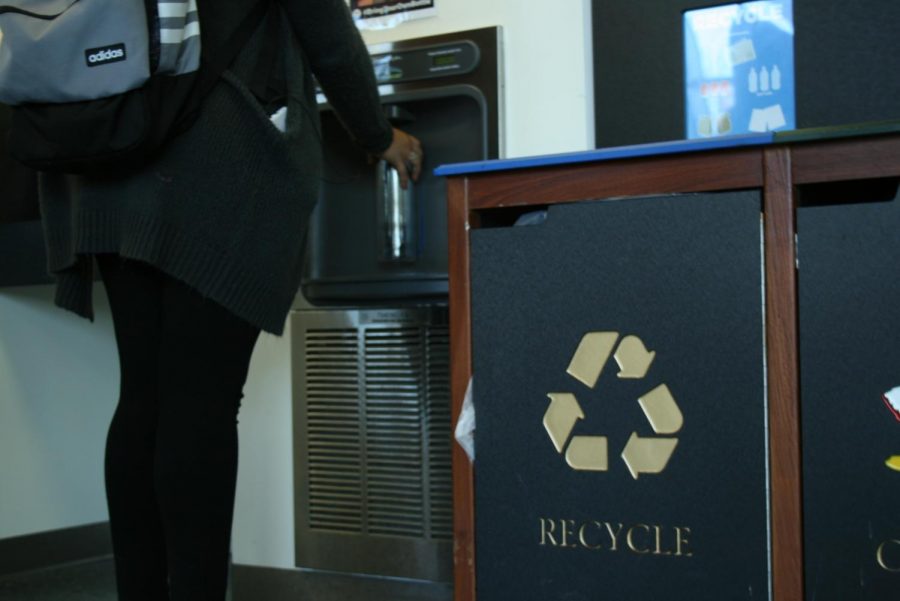SGA stands against plastic water bottles at large campus events
The letter does not advocate for a campus-wide plastic bottle ban
A student fills up their reusable water bottle at one of the many hydration stations on campus. (Brian Choquet/ Amherst Wire)
AMHERST — During events like the Welcome Back BBQ, university-branded disposable water bottles overflow waste bins and lay scattered after the crowds die down. The University of Massachusetts Amherst Student Government Association is trying to make this a thing of the past.
The UMass SGA Senate approved a motion Oct. 16 to send a letter to the Chancellor’s Sustainability Advisory Committee appealing for the phase-out of UMass-branded plastic water bottles at large-scale events on campus.
The letter, written in pursuit of the SGA’s goal to make UMass Amherst a zero-waste campus by 2050, is sponsored by the Undergraduate Experience Committee and the SGA’s Secretary of Sustainability Ainsley Brosnan-Smith. It aims to shed light on the contribution of UMass’ disposable water bottles to environmental waste and air pollution and recommends eco-friendly alternatives for mass distribution of water.
The letter states that “the United States uses 714 million gallons of oil every year to produce disposable plastic water bottles.” It also states that the manufacturing of UMass water bottles is “indisputably contributing to air toxicity, especially concentrated in communities of low-income housing,” where these manufacturers are commonly located.
“My goal is to call out these entities, and be like, you’re branding us as sustainable, but you’re still requesting to use these plastic water bottles that will never degrade in our lifetime and are just toxifying the air,” said Brosnan-Smith, a senior who has been involved with the issue since her freshman year.
One solution is mobile water stations, according to Matt D’Amico, former chairman of the UEC and the original writer of the motion. He said the university could invest more money in mobile water stations as an eco-friendly alternative to the water bottles. The university currently owns one of these stations.
Similar to the hydration stations that can be found in every academic building on campus, a mobile water station hooks up to the university’s water supply to provide clean drinking water. The price per station ranges from a few thousand dollars to $10,000. This one-time investment would allow the university to spend less money making and ordering custom UMass-branded disposable plastic water bottles for large campus events.
Water stations on campus would also prevent large amounts of plastic waste from sitting in plastic landfills. According to the letter, the water bottles have “a product specific recycle rate of only 23 percent nationally.”
“The image of someone buying a plastic water bottle, recycling it and the image of it turning into another plastic water bottle never happens,” said D’Amico.
The motion to send the letter to the Chancellor’s Sustainability Advisory Committee was originally voted down at an SGA meeting two weeks prior. D’Amico said senate members initially did not understand the motion, and misinterpreted it as a ban on all types of plastic bottles. They were also concerned that Registered Student Organizations would not be allowed to order water bottles for their events on campus.
According to Brosnan-Smith, UMass’s 10-year Coca-Cola contract prevents a bottle ban on campus.
“People thought we would be taking away the plastic water bottles from the EMTs and stuff like that, which at any point isn’t outlined in the letter and that’s not something we would ever want,” said D’Amico.
The letter calls to stop the use of plastic water bottles at large scale campus events such as the Welcome Back BBQ, and recommends that “significant water infrastructure improvements are made to make this policy a reality.”
To D’Amico, the phase-out is a simple way to show UMass students how easy it is to avoid using disposable plastic water bottles. He also hopes to fight the common misperception that tap water in areas such as Amherst isn’t safe to drink.
“I don’t believe people are so selfish that they don’t care about other people who are being affected by the plastic industry, that are having their air polluted,” said Brosnan-Smith. “I just like to think we just need that educational outreach.”
Email Brian at bchoquet@umass.edu or follow him on Twitter @BrianShowket.

"The hero of my tale–whom I love with all the power of my soul, whom I have tried to portray in all its beauty, who has been, is, and always will be...

